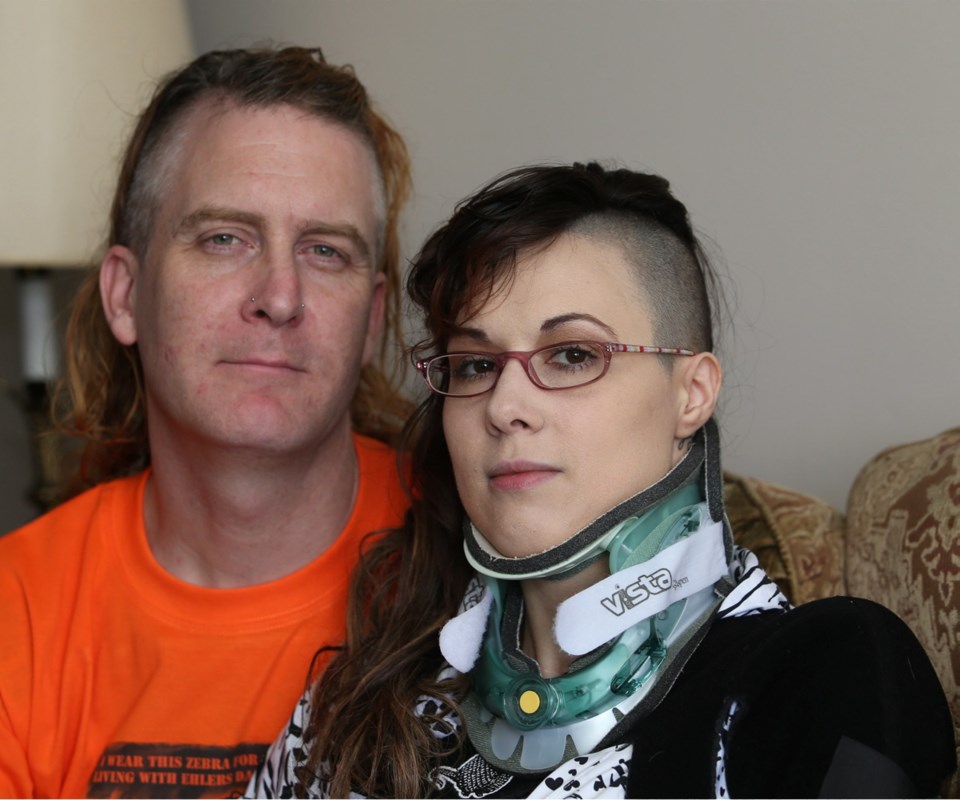Although she’s encased in braces from head to toe and suffers chronic pain, an Esquimalt woman cannot persuade the federal government to provide her with disability payments.
Anna Werrun, 30, has twice appealed the Ministry of Employment and Social Development’s decision to deny her disability benefits through the Canada Pension Plan. Most recently, she applied to go before a social security tribunal to plead her case in person, but was denied in April.
She’s now seeking assistance from a lawyer and Randall Garrison, MP for Saanich-Esquimalt-Sooke.
Werrun said she’s physically unable to work, often suffers severe pain and is forced to spend much of her time lying down. Her doctors confirm the seriousness of her illnesses and her unsuitability for employment.
“Some days are better. Other days I have such bad pain, including pain in my head. It’s full body everywhere,” she said.
Employment and Social Development Canada turned down a request for an interview. Government spokeswoman Evelyne Labrie told the Times Colonist via email that Werrun was denied payments because her disabilities fail to meet the definition of “severe and prolonged.”
In a prior letter, Employment and Social Development Canada said medical evidence fails to support Werrun’s claim that she’s unable to work.
She had a successful operation for thyroid cancer in 2008. Werrun had her thyroid and parathyroid glands removed, as well as 29 pieces of tissue from her neck.
After further testing, she was diagnosed with Ehlers-Danlos syndrome, postural orthostatic tachycardia syndrome (POTS) and mastocytosis.
EDS is a group of inherited disorders that can affect the body’s connective tissue and lead to chronic pain. POTS can trigger an abnormally high heart rate, weakness and shortness of breath, blurred vision, fainting and migraine-like headaches. Mastocytosis is a rare disorder resulting in accumulations of mast cells in the skin, bone marrow and internal organs; these cells ordinarily help defend against disease and aid in healing. Accumulations can cause itching, hives and anaphylactic shock.
Werrun said her symptoms include pain throughout her body, weakness, muscle spasms, severe allergic reactions, migraines, extreme fatigue and fainting. Often her joints dislocate, necessitating the wearing of braces all over her body, including her fingers.
“It’s not fun,” Werrun said. “The joints in my legs, they do this weird grinding thing. My joints pop out. … These bottom ones on the left, they dislocate all the time.”
On a scale to 10, she says her pain is “sometimes above 10. It’ll be like 15 and I can’t move.”
The seriousness of her condition is supported by three Victoria doctors who wrote letters to the Ministry of Employment and Social Development.
“Anna will be having difficulty completing her own necessary activities of daily living, let alone performing to expectations of employment in any meaningful employment setting,” wrote Dr. Gudrun Aubertin, a clinical geneticist with Vancouver Island Medical Genetics.
Aubertin wrote that Werrun suffers from “significant autonomic nervous system dysfunction, her joint hypermobility and progressive joint pain.” She continued: “Anna has been very diligent in attending her specialist appointments and seeking out any opportunities to treat and manage her condition.”
In an interview, Aubertin said she believes Werrun should receive federal disability benefits and that government should heed the diagnosis of her doctors.
Another doctor who treated Werrun for 10 years wrote: “Following the [cancer] surgery, she has had an avalanche of health issues that have conspired to totally incapacitate this young woman from pursuing any type of gainful employment. … I do not believe she would be capable of holding a job.”
Theresa Kantarakias lobbied on Werrun’s behalf for a year as an advocate with Victoria’s Action Committee of People with Disabilities. She said refusing Werrun CPP disability payments is “very unfair.”
Kantarakias said the federal government is biased against Werrun because she’s applying for benefits at a young age.
“I’m somebody who’s completely angered by the whole situation. It’s not just Anna. There’s a whole bunch of people who are being denied. And they’re clearly not able to work,” Kantarakias said.
Werrun’s husband, Loran Werrun, raised more than $4,500 over the past two months through a public GoFundMe campaign. That allowed his wife to buy some equipment, but she is still unable to afford basics such as a shower chair, a wheelchair and physiotherapy.
Before getting sick, Werrun held a variety of jobs, including receptionist and waitress. She worked periodically as a self-employed artist in 2012 and 2013. She did this mostly for therapeutic purposes and received little money, saying “it was not gainful employment.”
Werrun said she does not qualify for provincial disability assistance. Her husband, who pays all the couple’s expenses, makes a modest living as a DJ and bartender at the Red Lion Inn.
She added: “I just feel I’ve been dealt a very unfair hand in life. And now I’m dealt an unfair hand by not getting help from the [CPP].”



